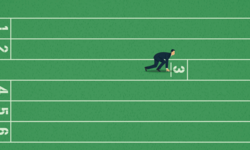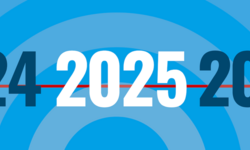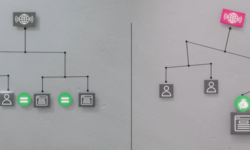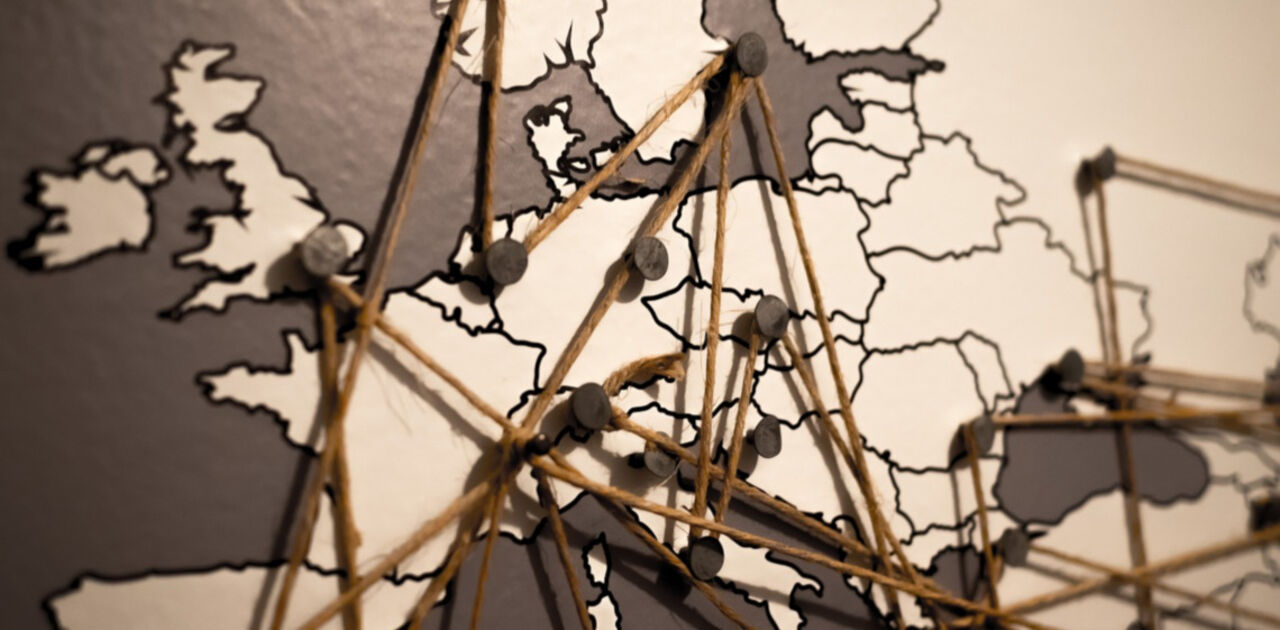
Net Neutrality vs. 5G: What to expect from the upcoming reform in the EU?
The principle of net neutrality has been protected in the European Union since 2016. Half a billion people benefit from the protection against network discrimination by telecom companies. Net neutrality is a founding principle of the internet and one of the most essential digital rights. It ensures the protection of the right to freedom of speech, the right to assembly, the right to conduct business, and the freedom to innovate on the internet. These protections came about in no small part due to the work of civil society. A coalition of 23 NGOs worked together for over three years to convince politicians and regulators of the importance of net neutrality. This victory may be called into question when the EU reforms net neutrality rules in 2019.
What do we know about the upcoming reform?
The net neutrality protections in the EU consist of two layers: one legal and one regulatory. The legal basis for the protections is part of an EU regulation, which takes precedence over national law and is directly applicable in all 28 EU member states as well as the three further countries in the European Economic Area (Norway, Iceland and Liechtenstein). This regulation gives the independent national telecom regulators the power and the mandate to protect net neutrality in their respective countries. To ensure that these 31 independent regulators apply the regulation uniformly throughout the EU and EEA, they must take “utmost account” of the guidelines on net neutrality that were issued by the European umbrella organisation of all telecom regulators, called BEREC. These BEREC net neutrality guidelines are an important document that provides a very detailed ruleset on what net neutrality actually means in Europe.
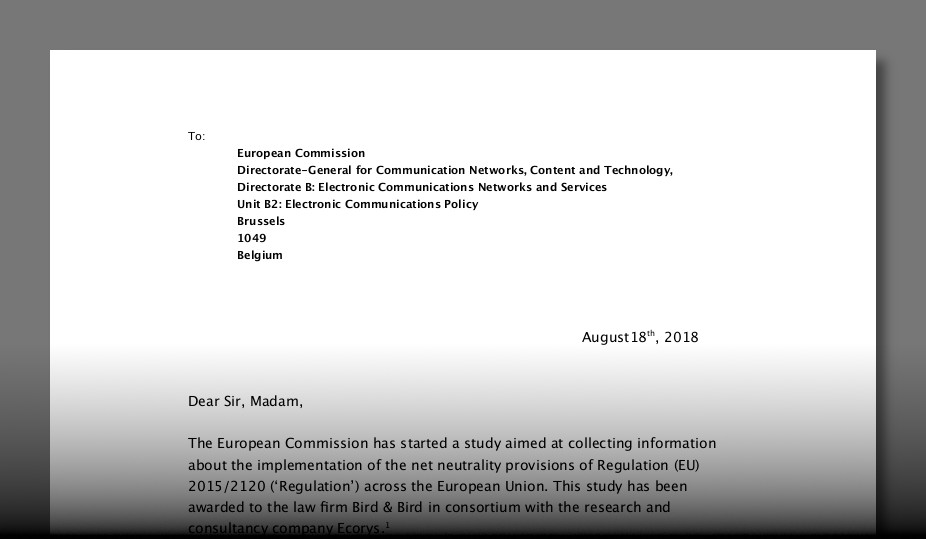
Our open letter to the European Commission outlining the conflict of interest of the law firm Bird & Bird.
The regulation prescribes that the European Commission has to submit an evaluation report by April 2019. For this purpose, it has outsourced that work to the law firm Bird & Bird, which is famous for assisting the telecom industry in resisting net neutrality protections. This has led to the peculiar situation that regulators and civil society have to answer questions about the strengths and weaknesses of the regulation to the same Rotterdam office of Bird & Bird which they also face in court in a case based on the same regulation. Several NGOs, including epicenter.works, have sent an open letter to the Commission pointing out this conflict of interest, but the Commission has refused to acknowledge our concerns.
>> Read our interview with Bird & Bird for their evaluation report
Even if the Commission intends to reform the regulation – which we don’t know without seeing the evaluation report – such a proposal would probably not see the light of day before 2020, considering the elections to the European Parliament in May 2019 and the following reshuffle of political power in the European Union. On the other hand, BEREC conducts itself more transparently and has already announced on several occasions that it intends to review the net neutrality guidelines. Since the release of its draft work programme for 2019 a month ago we also know that this review is planned to start next year and will lead to new draft guidelines, followed by a public consultation process in late autumn.
>> Read the civil society response to the consultation of the BEREC draft work programme
UPDATE: The finalised work programme 2019 shows that the adoption of the guidelines will be in the 1st plenary of 2020 (probably late March).
Can we bring 5G in line with net neutrality?
So what is to be expected of this reform? The telecom industry has made it very clear what they want to talk about: 5G. The new mobile network standard has not even been fully specified, but it is already the biggest talking point of the industry and is used to call into question existing net neutrality protections around the world. With the US having stepped away from their 2015 Open Internet rules, Europe is now the first major world region that tries to bring 5G in line with net neutrality. This debate has a technological and political side. Technologically, 5G brings a new option for telecom operators to deepen their control over the information flow. It is called “network slicing” and it brings differentiated Quality of Service policies to the radio access network. The scenarios range from preferential treatment for premium subscribers at the expense of everyone else to a complete segmentation of the internet with granular control of the network over every application.
Whether the application of this new industry standard has to follow existing telecom law or whether the law should adapt to the standard ought be an easy question to answer, but given what we have heard from the industry, this might not be the case. At the recent global Internet Governance Forum in Paris representatives of Vodafone and AT&T strongly argued for watering down existing net neutrality rules in order to make a 5G rollout more economically viable.
>> Watch our session at the IGF together with Indian, Canadian and French regulators
5G offers providers far more control when it comes to giving preferential treatment to individual applications or internet subscribers, but it also brings interesting new features like specifying a low energy network slice, which could be used, for example, by solar powered IoT devices. BEREC has taken it upon itself to tackle this issue upfront. This means that regulators will decide if the strong protections against the abuse of exceptions to the net neutrality in the regulation (so called specialised services) will be upheld or watered down. The current BEREC chair Johannes Gungl from the Austrian regulator RTR was quite blunt in an industry forum when he talked about incompatibilities between the regulation and a 5G roll-out:
“According to our findings, there is no evidence for it on [the] table. We haven’t seen any use case so far which wouldn’t be possible under the existing rules. Therefore, we think that the current Net Neutrality framework is flexible enough for 5G.”
Executive Director of Austrian regulator RTR and current chair of BEREC
Sadly Mr. Gungl will be replaced as head of RTR by Klaus Steinmaurer, the former Vice President of International Regulatory Affairs of Deutsche Telekom.
If Europe follows the push of the telecom industry to water down its net neutrality rules and allow a two-tiered internet system built on a sliced up 5G network, this could have serious ripple effects in the rest of the world. Should the USA and Europe allow 5G to become the exception to net neutrality, then the end of the open internet in the west will become a question of the roll-out of the next mobile network technology.
The protections in Europe are not perfect, but they provide for clear proceedings in rule making, in which hopefully as many stakeholders as possible will participate. The telecom industry has made it clear that this is a major priority for them, but so far it is unclear which actors, besides civil society, will join the debate on the side of net neutrality.
The unresolved business of Differential Pricing Practices (Zero-Rating)
The final ruleset in Europe comes quite close to the US 2015 FCC Open Internet rules. Particularly regarding the issue of Zero-Rating it does not offer a so-called “bright-line rule”. This means that the final decision on the legality of commercial offers that discriminate between applications based on price is left to the regulator. While Zero-Rating offerings are now on the market in all but one European country, not a single regulator has prohibited such an offer even once. In some countries we see a 70-fold price difference between data volumes for accessing Facebook compared to data volume that can be used on the entire internet. Low income and young internet users are especially affected by this strong incentive to only use well established internet services.
The reform of net neutrality will have to tackle this issue. The regulation clearly states that there are cases in which regulators have to intervene against zero-rating. While a bright-line rule banning zero-rating would be the best possible outcome, at the very least more guidance has to be given to regulators when it comes to different forms of economic discrimination that are clearly harmful to end-user rights. epicenter.works will publish a report on the net neutrality situation in Europe in early 2019 and it will include a complete mapping of zero-rating offers in the European market.
>> Download our mapping of penalty provisions for net neutrality violations in the EU
Ultimately, the future of net neutrality depends on people that support it. The best way to sustain our work in defence of the open internet is by donating or becoming a supporter. We provide extensive studies and release data on the phenomenon of net neutrality. We advocate in several parliaments for stricter rules and try to educate lawmakers. When regulators are unwilling or unable to do their job, we dig out cases that support them with their enforcement duty. Finally, we do all of this not because somebody is telling us to do so. Instead, we are deeply committed to digital rights and have been so for the past eight years. Please help us continue this work.
Since you're here
… we have a small favour to ask. For articles like this, we analyse legal texts, assess official documents and read T&Cs (really!). We make sure that as many people as possible concern themselves with complicated legal and technical content and understand the enormous effects it has on their lives. We do this with the firm conviction that together we are stronger than all lobbyists, powerful decision makers and corporations. For all of this we need your support. Help us be a strong voice for civil society!
Become a supporter now!

